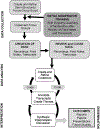Prevention of Lower Urinary Tract Symptoms Research Consortium Focus Group Study of Habits, Attitudes, Realities, and Experiences of Bladder Health
- PMID: 31287183
- PMCID: PMC8088730
- DOI: 10.1111/jan.14148
Prevention of Lower Urinary Tract Symptoms Research Consortium Focus Group Study of Habits, Attitudes, Realities, and Experiences of Bladder Health
Abstract
Aim: The study purpose is to explore adolescent and adult women's experiences, perceptions, beliefs, knowledge and behaviors related to bladder health across the life course using a socioecological perspective. Lower urinary tract symptoms affect between 20-40% of young adult to middle-aged women, with symptoms increasing in incidence and severity with aging. There is limited evidence to address bladder health promotion and prevention of dysfunction. This first study of the Prevention of Lower Urinary Tract Symptoms (PLUS) Research Consortium is designed to address gaps in existing qualitative research in this area.
Design: This focus group study will be implemented across seven geographically diverse United States research centers using a semi-structured focus group guide informed by a conceptual framework based on the socioecological model.
Methods: The study was approved in July 2017. A total of 44 focus groups composed of 6-8 participants representing six different age categories (ranging from 11 to over 65 years) will be completed. We aim to recruit participants with diverse demographic and personal characteristics including race, ethnicity, education, socioeconomic status, urban/rural residence, physical/health conditions and urinary symptom experience. Up to 10 of these focus groups will be conducted in Spanish. Focus group transcripts will undergo content analysis and data interpretation to identify and classify themes and articulate emerging themes.
Discussion: This foundational qualitative study seeks to develop an evidence base to inform future research on bladder health promotion in adolescent and adult women.
Impact: This study has the potential to provide new insights and understanding into adolescent and adult women's lived experience of bladder health, the experience of lower urinary symptoms and knowledge and beliefs across the life course. This article is protected by copyright. All rights reserved.
Keywords: bladder health; focus groups; lower urinary tract symptoms; nursing; primary prevention; qualitative research; socioecologic model; urinary symptoms; urologic nursing; women's health.
This article is protected by copyright. All rights reserved.
Conflict of interest statement
Conflicts of Interest: None
Figures


References
-
- Andersson G, Johansson JE, Nilsson K, & Sahlberg-Blom E (2008). Accepting and adjusting: older women's experiences of living with urinary incontinence. Urol Nurs, 28(2), 115–121. - PubMed
-
- Baccellieri A, Low LK, Brady S, Bavendam T, Burgio K, Williams B, … The Prevention of Lower Urinary Tract Symptoms (PLUS) Research Consortium. (2018). Distress Protocol for Focus Group Methodology: Bringing a Trauma-Informed Practice to the Research Process for the PLUS Consortium Study of Habits, Attitudes, Realities and Experiences (SHARE) Study. Paper presented at the American Public Health Association Annual Meeting & Expo, San Diego, CA.
-
- Baerheim A, Digranes A, Jureen R, & Malterud K (2003). Generalized symptoms in adult women with acute uncomplicated lower urinary tract infection: an observational study. MedGenMed, 5(3), 1. - PubMed
-
- Brady SS, Bavendam TG, Berry A, Fok CS, Gahagan S, Goode PS, … Prevention of Lower Urinary Tract Symptoms Research, C. (2018). The Prevention of Lower Urinary Tract Symptoms (PLUS) in girls and women: Developing a conceptual framework for a prevention research agenda. Neurourol Urodyn, 37(8), 2951–2964. doi:10.1002/nau.23787 - DOI - PMC - PubMed

